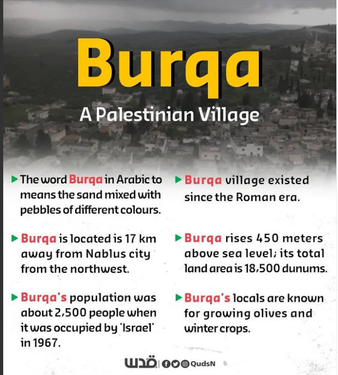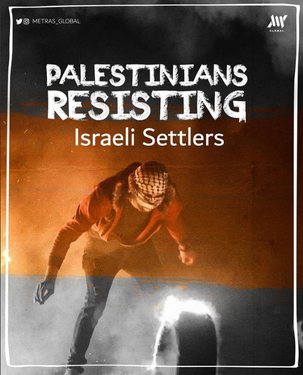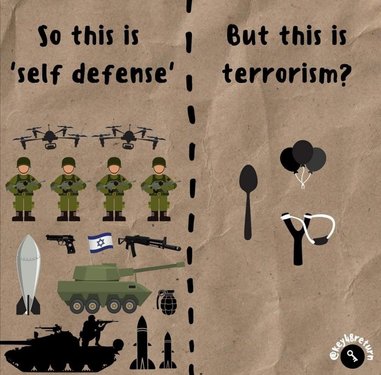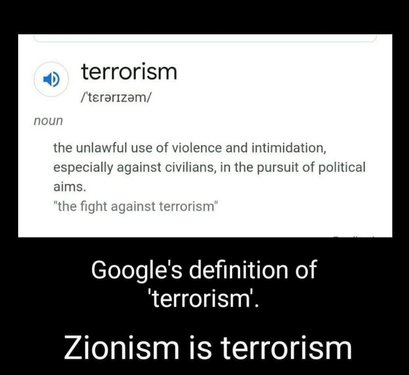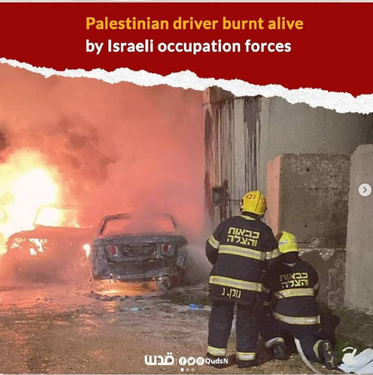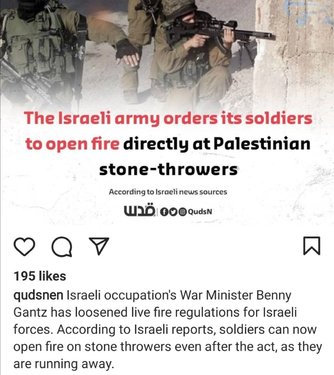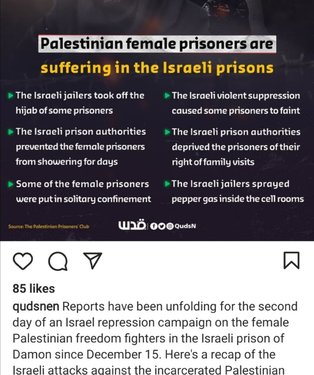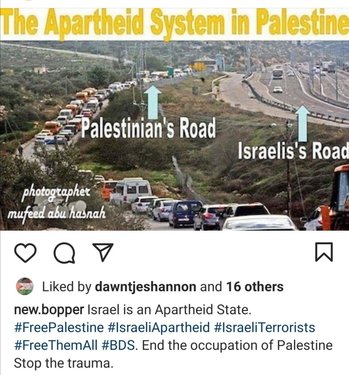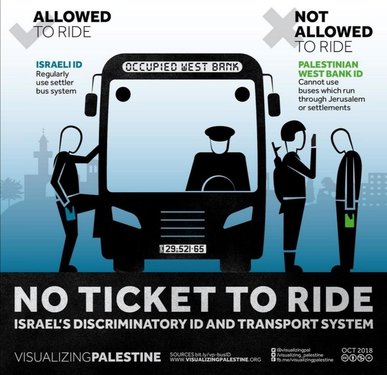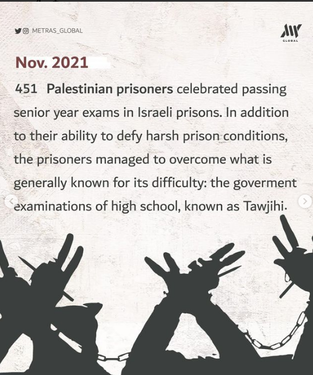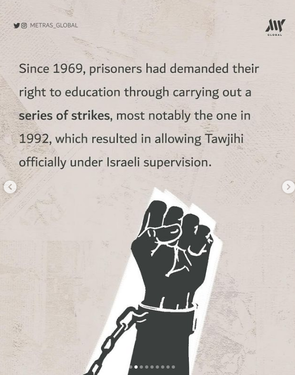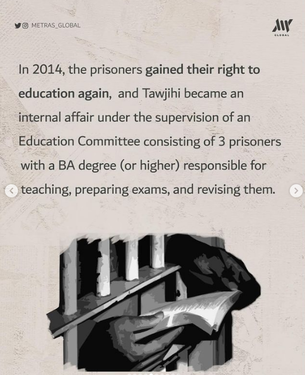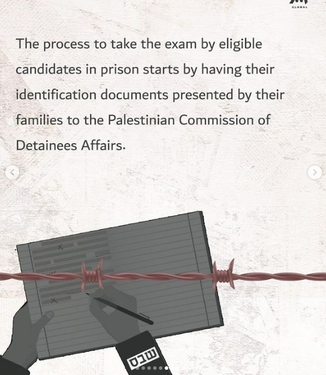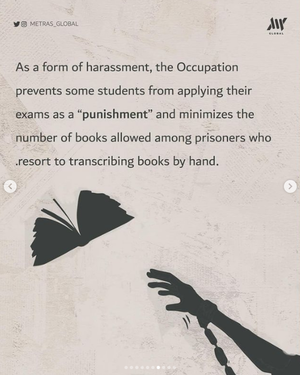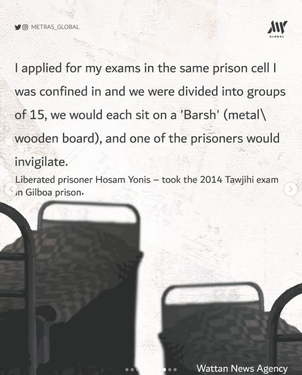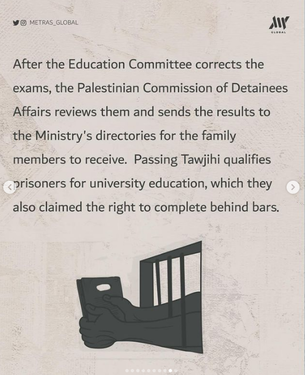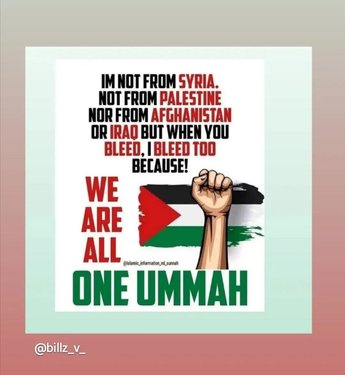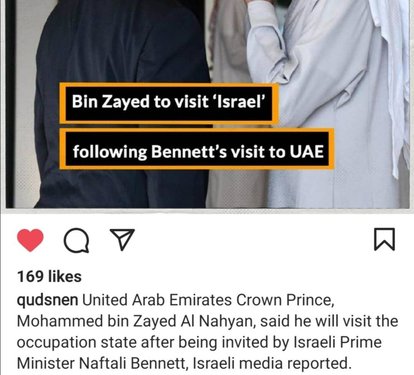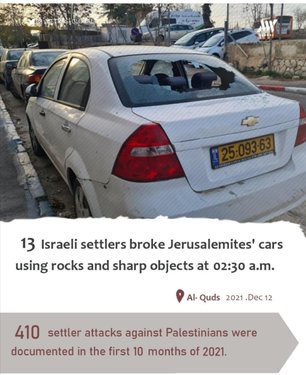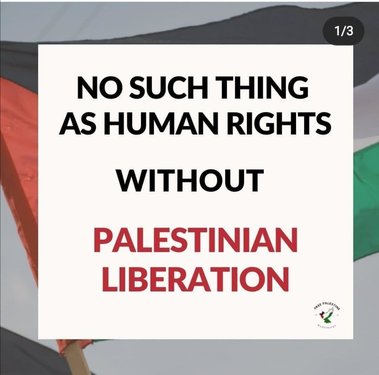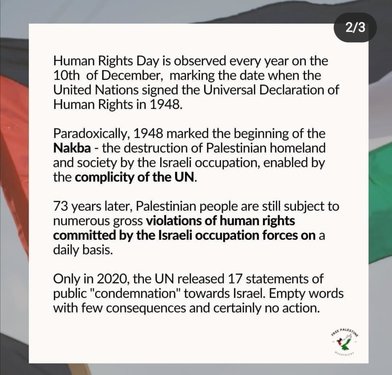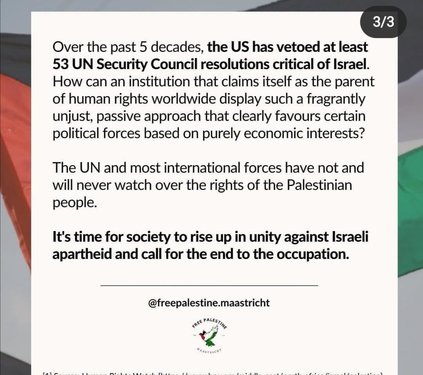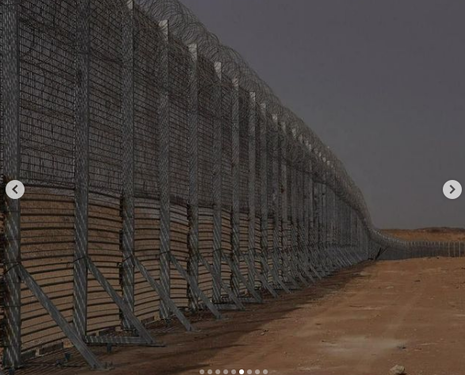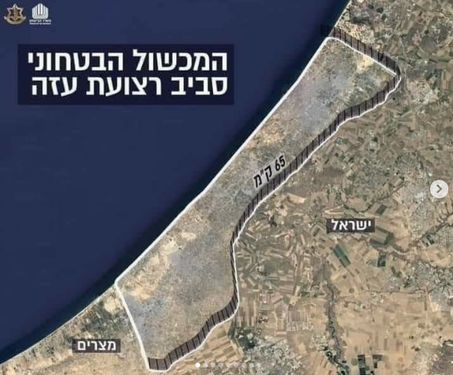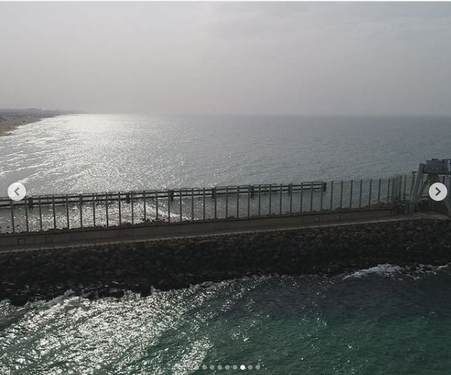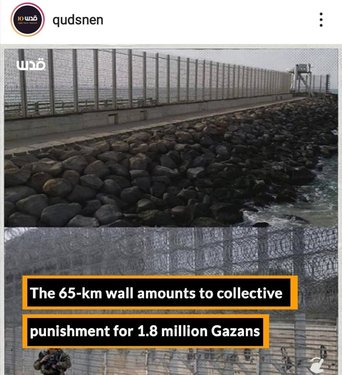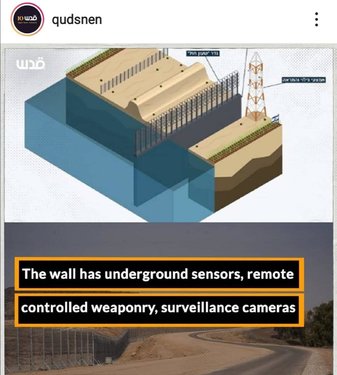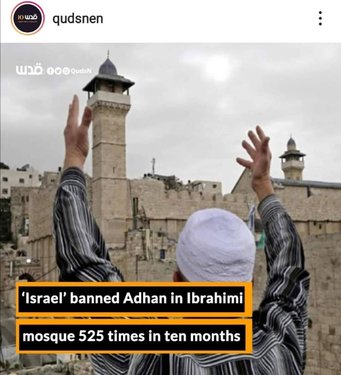-
Posts
8,434 -
Joined
-
Days Won
771
Content Type
Profiles
Forums
Events
Everything posted by ummtaalib
-
Settler Attacks on the Village of Burqa Israeli settlers, for over a week, have been waging a wave of violent attacks against the village of Burqa in the north of the occupied West Bank. Homes were vandalized, defenseless residents were terrified by aggressive settlers, and the Israeli soldiers served protection to the settlers.
-
Palestinians in several villages between the cities of Nablus and Jenin have been confronting Israeli settlers, over the past ten days, in an act of resistance against Israeli settlers and settlements.Settlers led provocative marches, attacked Palestinians and their properties in Burqa, Sebastia, Beita, Silat al-Dhaher, and Bizzariya villages, and vandalized graves in Burqa. All that was committed under the support of the Israeli Occupation Forces who fired live and rubber-coated bullets and tear gas, wounding and suffocating around 300 Palestinians.Today, there are +500,000 Israeli settlers living in Israeli settlements in the West Bank. Since Jan. 2021, settler violence has been escalating, amounting to around 410 attacks against Palestinians and their properties (by the end of Oct. 2021).Palestinian villagers and Palestinians from nearby cities stand strong defending their lands in the face of settlers’ attacks and the colonial systematic policies supporting them to confiscate Palestinian lands. MetrasGlobal (@metras_global) • Instagram photos and videos
-
A Palestinian driver was burnt alive by Israeli occupation forces who opened gunfire at his vehicle's fuel tank during an alleged car-ramming attack at the Israeli military checkpoint of Dothan, southwest of Jenin in the occupied West Bank.
-
#ApartheidIsrael Palestinians have been divided into four groups. The first are Palestinian citizens of Israel, who currently have greater freedom of movement (than other groups of Palestinians) and are accorded the right to vote in Israeli Knesset elections, although they experience many inequalities and restrictions in public life. The second group are those Palestinians who reside in East Jerusalem but are not citizens. The third are residents of the rest of the occupied West Bank, and the fourth are the residents of the Gaza Strip. An additional fifth category consists of Palestinian refugees who are simply barred from returning to the country altogether. Each of these groups experiences apartheid differently, but the overall scheme is governed by the same ideology and policy of privileging Jews over non-Jews. Source
-
High School Education behind Israeli bars With smuggled pens and lessons written on cigarette boxes, Palestinian prisoners fought their way to claim their right to education in Israeli prisons, so how does the senior year of high school (Tawjihi) look in confinement? MetrasGlobal (@metras_global) • Instagram photos and videos
-
-
#Boycott UAE UAE welcomed the Israeli occupation Prime Minister Naftali Bennette in a first official visit to the country yesterday News today:
-

The Truth and falsehood---3
ummtaalib replied to shaikhrafique's topic in General Islamic Discussions
Please maaf Shaykh but the huge font and bolded, coloured text just makes too difficlut to read so edited your post -
The following are some notes/pointers based on the Talk “Patience & Forbearance” delivered by Aalimah S. Kamaluddin Ahmed Source There are two words in the Arabic language, also in Urdu: • One word is called hilm; ha-la-meem, • Second is called tahammul, which is ha-meem-la. • In Arabic, sometimes → a root word with the same huroof, even if you interchange two of the huroof, they have some type of relationship with one another. Meaning of Hamal: → Word hamal in the Arabic language →it means to carry. → Like you say in Urdu, hamila, and in Arabic too, hamila means a pregnant woman; someone who carries something. → And literally it means a person who carries a burden. Hamal means someone who carries a burden. And this burden can be in two ways: • A physical burden • An internal burden; that is, carrying a weight in your heart. Which we often say in the Urdu language that you have heaviness in your heart, heaviness in your chest; carrying a burden In your heart. → So this is a hidden burden that many people have, and the word for this comes from the same roots: →hamal also means internal burden. Tahammul: So this word tahammul comes from this root word called hamal. a) Tahammul, having a burden, means that you’re doing something that is difficult. Despite the difficulty, you choose to carry it. b) Another part of having tahammul is that when a person has the ability to decide not to carry it. they have the choice. They chose to carry it. • And they are in a situation where if they didn’t want to carry it, they could have reacted, and not carried it. • And this could be a special situation, when somebody has done an injustice to you. And instead of getting back, taking revenge, you decided to forgive. Decided to take it, to accept the burden. • And when you put off taking revenge and you had the desire, you had the jazba, to do something, you decide not to do it, and you decide to forgive. This also requires tahammul; you also need tahammul mazaaji for this. • So we often call tahammul in Urdu: bardaasht; Darguzar karna, bardasht karna. (c) Another aspect of tahammul is that you bear someone else’s affliction. You bear the sorrow that someone else gives to you. The grief that someone else causes, you bear it and you over look it. • On a higher level, you forgive it. And on the highest level, you forget it. Summary: →This is tahammul: it means all of these things; carrying a burden, an internal burden. And this is difficult, when you could have done something to release that burden, but deciding to carry that burden internally, when someone has hurt you, when someone has afflicted you with some type of grief and sorrow. Not to hurt them back, but rather to overlook it, forgive it, forget it. → And this is called tahammul, this means carrying this heavy weight. Hilm: • Now looking the second word, which is in a verse in the Quran. • One of the names of Allah swt is Al-Halim. • Halim is also an interesting word; in English, it is translated as forbearance. Halim, soft, a person who is forbearing, who is patient. Not just patient, but on a higher level, that you can forbear difficulties. So actually, there is a big association between tahammul and hilm. In the huroof, and also in the definition, in the explanation. And in this verse, Allah swt is saying: وَكَانَ اللَّـهُ عَلِيمًا حَكِيمًا (Surah Fata’h: 4) And you can see that often in the Quran, when Allah swt mentions His Sifaat, often there are two together. You have Ghafoor ur Rahima, Rehman and Rahim; often two two sifat are paired together. And when you look at the tafsir, some mufassireen often write that there is some type of connection between those two sifat. And in this verse and other verses, you often see that Allah swt is ¬Al-‘Aleem, He is All-Knowing, and He is Al-Halim, He is extremely forbearing. He has this tahammul mizaaji. So in this verse, there’s a secret in this. If you look at it, when someone wrongs you or when someone hurts you, and if you want to forgive that person, you forgive him/her on the basis of what you know. They’ve hurt you; they did something to you, you forgive them. You don’t even know the whole story. You might just know ten percent of the story. What they have said to you, to your face, that is what you’re forgiving them for . You don’t know what they’ve said behind your back, what they’ve said, what they thought. You don’t know any of that, but whether you forgive them or get angry with them; whatever your reaction is, that is on your limited knowledge. →Now here, in this verse, Allah swt is saying that He is Al-Aleem. He knows; He knows at a very very deep level. • He knows when you thought of something; how that thought crept into your heart; how it crept into your mind; how you demonstrated it; how you showed it; if you felt remorse, if you didn’t feel remorse. If you showed regret; if you did tauba, if you didn’t do tauba. • He knows the intentions of your heart, the workings of your heart; He is closer to you than your jugular vein. →Allah swt is Aleem, but at the same time, He is also Halim. • That He knows 100% what we’re thinking, what we’re doing, But He chooses to have that tahammul, He chooses to overlook. He chooses to forgive. He chooses to give us a second chance, despite His being All-Knowing. So this is something that we have to learn. There is a saying in the Arabic language, maybe a Hadith: “Takhalluqu bi akhlaqillah” – that you should make your akhlaq, your mizaaj, your attributes like the attributes of Allah swt; the attributes that we can share with Allah swt. Like being rahim, like being halim. And often you see that it’s interesting that when you study Quran and Hadith, that the relationship that you have with Allah swt, that if you want Allah swt to forgive you, then you have to be forgiving to other people. Famous Hadith: Where the Prophet sallAllahu alaihi wasallam says that “If you want Allah to have rehem on you, then you should have rehem towards other people”. If you want Allah swt to do purdah poshi of your sins, then you should do purdah poshi, i.e cover the sins of your fellow Muslim brothers and sisters. If you want Allah not to be angry with you, then you should also not be angry with your fellow human beings. → So there is a lot of this dual relationship; this very dynamic relationship that we have with Allah swt. If we absorb those sifat, and we try to get these traits in ourselves, then Allah swt will also treat us in the same way. It’s very much a give-take relationship; how we treat makhlooq; how we treat creation, is very much how Allah swt is going to treat us. Knowledge and Tolerance: So if Allah swt, despite all His knowledge, He is Halim, He is Forgiving, He is Forbearing, He knows everything we did, He hears everything we said; He sees how we have lead our life. And if he still chooses to overlook, then who are we not to forgive? Who are we to be intolerant, to be unforgiving? So we have very little knowledge, but we are so intolerant. We have so little knowledge, but we don’t even forgive, let alone forget. Forgiving to bohat bari baat hai; forgetting to bohat door ki baat hai. So Allah swt has so much ilm and so much hilm. We have so little ilm and we have little hilm. These two things go together. When someone has hurt us really badly, when we know the faults and mistakes of somebody, we are ready to cut off relations. • A husband and wife have a dispute; the wife is ready for a divorce. • The children are ready to leave the house. • When we have these problems, with our family members or any relations, we are ready to cut off. Allah swt doesn’t do that. With Allah swt, we do so many things to spoil this relationship, we do so many things to hurt this relationship. Our Relationships in life: And I often say nowadays, shayad mera zehen bhi is taraf ho raha hai (my thoughts are often inclined towards this matter), about relationships, that everywhere people have relationship issues. Whether they are old, or young or middle-aged, everyone has relationships in their lives. And often for women, it is like their whole life is full, their whole life is made up, composed of different relations. Being a sister, being a daughter, being a mother, a daughter-in-law; being a wife. So many relationships, and we’re so worried about giving each relationship its due right; making so many people happy in our lives. →We forget that the biggest relationship that we have, and the longest and most lasting relationship that we have is with Allah swt. When all these other relationships end, and sooner or later they do—either they die down, and you’re not always going to be a sister; maybe some day you’re not going to have any siblings. You’re not always going to be a daughter, sooner or later you’re going to lose your parents. You’re not always going to be a mother; sooner or later your children will go and leave. And your being the mother of young children, that episode of your life is going to finish. You’re not always going to be a wife. Sooner or later you might be a widow, you might not have your husband. So the only relationship that is going to help you from the beginning of your life to the end of your life, to the qabar, to the Akhirah, is your relationship with Allah swt. • So we do so many things to ruin this relationship, but Allah swt doesn’t cut this relationship with us. He continues to give, continues to forgive; continues to give us rizq, continues to take care of us; continues to keep this bond alive. • We sin, He brings us back to the masjid. • We say things with our tongue which are displeasing to Him, Allah swt still gives us the ability to speak, he gives us izzat. We do sins at night, without doing proper taubah and in the morning, Allah swt gives us izzat. People still respect us, give us praise. Allah swt is that Being in the universe who has the highest level of tahammul, the highest level of hilm, and, interestingly, the highest level of ilm. The most Aleem and the most Halim. Another point: He has the most Qudrat, the most capability, take intiqaam. • To take revenge. We know a little bit, and we’re ready to fight it out. We know a little bit, and we’re ready to blast that person out of the water. Allah swt knows so much and He is the most Forgiving. • So this is one sifat; this is one attribute that we have to work on as human beings. And this is something that we should see in ourselves. How forgiving are we, how much rehem do we have; how much are we ready to forgive the faults of others? • And actually, when a person praises you, koi bhi aap ki tareef karay, you should think that this person is not praising me, he is praising Allah swt. Who has hidden my faults from the universe, from creation, from people. • So it is Allah swt’s tahammul mizaji that He doesn’t humiliate us in this world. That He continues to forgive us, continues to give us rizq, continues to sustain us. Another aspect of Allah swt’s hilm: Muhlat • Is that He gives us muhlat. Muhlat is translated in English as in He gives us extra time. Like when you’re giving an exam, you’re turning in a paper, you ask your teacher ; can I have an extra day to hand in my assignment; can I have an extra two days to work on my paper. A person who is halim, who is forgiving and tolerant, he will give you the extra time. • Allah swt is the most halim. Woh muhlat daitay hain, daitay hain, daitay hain, (He keeps on and on and on giving muhlat) until the end of your life. Till the day you die, till the last breath, He’s giving you muhlat, with the hope that this person might rectify, that this person might change. That maybe he will make tauba now, shayad woh tauba kar lay, shayad tauba kar lay. → To the extent that—ajeeb—it comes in a Hadith that when a person sins, the angels don’t write the deeds immediately. → The angel waits; if the person sins in the morning, the angel waits till the evening. Keh shayad yeh banda tobah kar lay (Maybe this person will make tobah); if she does tobah, then I won’t even write the sin. → And if she doesn’t do tobah by the evening, then the angel will write down the sin. • Giving muhlat—ajeeb baat hai—there are some scholars who say that there are some people, some hastis, some of whom are still here; some of whom have left, that the angel who writes their bad deeds hasn’t written for 20-30 years. Has nothing to write down. → It doesn’t mean they don’t sin; even if they sin, they constantly do tobah. So this is where Allah swt give his muhlat. In a Hadith it comes that all of Bani Adam are sinners. And the best of sinners are the ones who do tobah. → So this is Allah swt’s muhlat. He gives it to us on a daily basis. He gives this to us throughout our lives. He gives this to us at different times of our live, the ups and downs of our lives. → He gives us these windows of opportunities keh kabhi muhasiba karo, kabhi socho (reflect on yourselves sometime; think sometimes). He gives us happiness to do shukar; use these times to reflect upon the naimats of Allah swt. → He gives us sadness and grief. There is a verse in the Quran that 15:35 Yehi woh hasti hai jo tumhain hansati hai, aur yehi who hasti hai jo tumhain rulati hai وَأَنَّهُ هُوَ أَضْحَكَ وَأَبْكَىٰ (An-Najam: 43) This is the same zaat. So this is our relationship, our very dynamic relationship that we have with Allah swt. Allah swt gives us happiness, He gives us grief, but the purpose and the point is just one. That we develop this relationship; make this connection with Allah swt. Make it the strongest connection and the strongest relationship you have in your life. Make it the most important relationship you have in your life. So this is something that Allah swt gives us muhlat. For rectifying ourselves, for changing ourselves. There is a qol by some buzurg (elder) who said that the birth of every child is proof that Allah swt has not given up on humanity. That the birth of every human is proof that Allah swt has not given up on humanity. We sometimes give up; we see the halaat, we see all the injustices going on; we open up the TV, everything is negative. You see the news, everything is negative, everything is like the end of the time, people are not humane anymore. People are very violent; we live in a very vicious society, we live in a very violent society; and a person can sometimes feel like giving up on humanity. Log aisay hee hain. Something bad happens to us, I think women especially are like that, when something happens, we become like bas log hee aisay hain (that people are all just like that). Jhootay hain, dhokay baaz hain (That they are dishonest and deceitful), that all people are like that. But from the beginning of time to this time, and till the end of time, through of all the people of the world, Allah swt still hasn’t given up. And all the Firouns, the Hitlers; all the evil people have come in, and Allah swt has still not given up on humanity. To Allah ki yeh zaat hai that has the most tahammul mizaaj. The most forbearing, the most forgiving, and Allah has the most knowledge, has the most ilm. If we look at our own self, often if you look at other people, it doesn’t matter what type of ilm that is, whether it’s your deeni ilm, whether it’s your general degree—often when a person has knowledge, when they have ilm, they have a Ph.D, they have a Masters, B.A, M.B.A, often ilm leads to a lesser hilm. Lesser tolerance, lesser forbearance, leads to more takabbur. More arrogance. These cause a person to become more critical. Critical thinking is a good thing, we develop it. Universities, university teachers or professors, think that critical thinking is good. But critical thinking in a way that helps you think, and not in a way that makes you critical of everyone around you. Not something that makes you lose tolerance for the people around you, for the human beings around you. But often you see this, that when a person has arrogance because of knowledge, and when a person becomes critical because of knowledge, this leads to less tolerance, less forbearance. The first entity of being that had takabbur was Iblees. Iblees said that And khairun minhu, that I am better than Adam (as), he had takabbur. And he had a lot of knowledge; it comes in the Hadith that he was an alim; he was an arif; and he was an abid; he used to worship. He had all these sifat, but he wasn’t an ashiq. He wasn’t a true lover of Allah. So he was mardood, he did these things which caused him to have takabbur. And when a person has takabbur, when they become highly critical, then they lose hilm. And true knowledge, true ilm, it actually leads to hilm. It leads to tolerance. In Urdu they say “ilm ki zeenat hilm kay saath hai .” if you want the beauty of knowledge; true wisdom, true beauty that leads to hilm is ornamented, is made beautiful by being tolerant. So often I say that is a person really wants a liberal education. Often colleges and universities around the world say that a liberal education promotes critical thinking, promotes tolerance. True liberal education, a true liberal mind, is through people who are tolerant. And tolerance doesn’t mean that they are just tolerant of people who are like themselves. Tolerant by nature means being tolerant of people who are not like you. They’re not like you academically; they’re not like you religiously, they’re not like you personality-wise, they’re not like you socio-economically—that’s what true tolerance is, that’s what true liberalism is. Liberalism doesn’t mean that everyone should just be like us; everyone should just be like the West, everyone should just dress a certain way. Liberalism means accepting, having hilm. So actually hilm, being tolerant, is actually what nowadays, in the Western world, or in the academic world, would be called tolerant, being a liberal. And actually, the beauty of true knowledge; a person who’s very wise; whatever wisdom they have in whatever studies they’ve done in their lives, it actually leads to hilm, to being tolerant. And that’s a problem, that we have knowledge. We have a lot of knowledge, whether it may be of the deen or the duniya, or college of Quran. Whatever knowledge we have, it doesn’t lead us to hilm. And actually, the more experience a person goes through, experience actually leads a person to be more tolerant. There’s a Hadith, mafhum is that a person who slips, a person who makes mistakes, they are more tolerant.Because they know that I make the same mistakes. And they are more tolerant of the person who makes mistakes in front of them. They are more forgiving of the person who makes mistakes in front of them. → So actually, true knowledge, true ilm leads a person to have fear of Allah, to have love for Allah, towards being tolerant towards other human beings. And this is something that our humanity is lacking. As human beings, what we are lacking in is tolerance. Whether a person is “deendar”, whether they are people who are “duniyadar”, whatever these terminologies, whatever their background, we are as a qom, as an ummat, we are becoming less and less tolerant. Whether it be in times of thinking, and people who called themselves “liberal” , there sometimes we find them the most intolerant. So this is something in which we have to look back to what our religion says about tolerance. and this is actually on a higher level. Actually, our deen, on a high level, it says that you should do good to someone who treats you badly. Hum yeh dekhtay hain (we should look at this), that if every person in the world, every time someone gave you a thorn to everyone who gave you a thorn, the whole world will be full of thorns. So you should do good to the one who wrongs you. A saying in Hadith about Isa (as). That once someone was curding Hazrat Isa (as), and they kept on saying and saying something, and someone said to Hazrat Isa (as), that why don’t you reply? Ap koi jawab kyoon nahin daitay? Nowadays if someone was to curse us and say something bad, hum uss ko foran, hazir jawab. And people think that this is a good thing, woh bohat taiz hai (she is very cunning)…hum kehtay hain keh yeh to bohat achi bachi hai (that this is a very smart girl), she can stand up for herself. We celebrate that; that’s actually anti-Islamic; it goes against the teachings of Islam. So Hazrat Isa (as)—someone asked him that why don’t you reply to that person, Hazrat Isa (as) gave a bohat pyara jawab (a beautiful answer): He said that every dish takes out what’s in it. That person is cursing me, that means that he has gandagi (uncleanliness) in him, and he is taking that out. And so Hazrat Isa (as) did not respond in kind. → So often in these pressurizing situations—you guys are in a pressure-cooker environment, academics, profession, family life. In these pressure situations, basically what’s in your heart, that will come out. → If you speak bad language, bad words, that means that is what’s in your heart. You have sabar, that’s what’s in your heart. You get angry, that’s what’s in your heart. You want to abuse the person, you want to hit the person, you want to do zulm on the person, you want to take revenge; that shows what’s in your heart. → Jo pressure cooker hota hai…that elicits our reactions. Do you have hilm; are you forgiving, or are you an angry person? Another Hadith: Once someone was arguing with Hazrat Abu Bakar Siddique (RA). And that person kept on arguing and arguing and saying things, and Hazrat Abu Bakar (RA) was quiet. And the Prophet salli Allahu alaihi wasallam was standing with him, and neither of them were responding, or saying anything to that person. And that person constantly kept on abusing, until finally Hazrat Abu Bakar (RA) couldn’t take it anymore and he said something. When he said something, the Prophet salli Allahu alaihi wasallam got up and left. And later Hazrat Abu Bakar Siddique asked that why did you leave. The Prophet salli Allahu alaihi wasallam said that until you were quiet, when you weren’t saying anything, the angels were responding on your behalf. They were cursing that person; they were responding on your behalf, and the minute you spoke, the angels left, and that’s why I left. → So this shows that if you have tahammul, if you have forbearance, it doesn’t matter what someone is saying to you, your reaction is tolerance. you take the higher ground. → That is what Islam teaches us on a higher level. And that’s the key; you can’t end a bad situation in a bad way. → If you want to purify; now this is a fiqhi point, you want to purify an impurity, you need something pure. If some gandagi is there, you have to wash it with water, wash it with a pure substance. You can’t wash it with something that’s impure. It would just make the thing even more impure. → So if you want to rectify the bad habits of people, the bad personalities of people, you have to do it with goodness; you have to do it by taking the higher ground; you have to do it with a pure heart. → And this is something, that if you look at the Shairah—someone asked, what about rights? The Shariah says we should fight for our rights. Now the Shariah in Islam says that it is actually allowed to take revenge when somebody has wronged you. When someone has done something, you can equally, according to the law, according to the courts, take revenge in equivalence. → However, the higher ground is to do sabar and to forgive. That’s why there is a verse in the Quran, 25:30. Those who do sabar and forgive. إِنَّ ذَٰلِكَ مِنْ عَزْمِ الْأُمُورِ (Surah Luqman : Verse 17) That verily, this is from the difficult things to do. The high things to do. → And if a person wants to have this sabar; sabar only comes when you forgive. Sabar comes when a person has this hilm, this tolerant nature, and this tolerant nature leads him to forgive. → And this is something that you can study in human psychology, that when someone wrongs a person, even if they can’t do anything and they hold it inside—if they don’t forgive, it will eat them inside. It will eat their heart; they will have problem, they will have high blood pressure; they won’t be able to sleep at night. → And if you ever follow court cases, especially in the US, all these law and order shows, etc; often people, if you read real life situations, if someone has committed a grave injustice; someone killed their child; someone killed someone beloved to them; some big injustice was done upon them, they said I have to forgive. If I don’t forgive I can’t live. → So you have to forgive. If we don’t forgive, as human beings, then we are going to lose our humanity. We cannot be human beings. Our heart will eat up our spiritual heart, and we will begin to live like animals. Leading animalistic lives: And that’s the problem, I think most of humanity 27:03 aksarun naas la ya’lamoon. Most of humanity does not know. Most people live animalistic lives. Khain, piyain, enjoy, if someone hurts you, hurt them back, take revenge. That’s animalistic thinking. That’s the way our society is going. That’s why we’re losing our humanity. That’s why crazy things happen. People read about them and ask what’s going on in this world, it craziness, and then switch the channel, or turn the page of the newspaper. So this is where we’re losing our humanity, We don’t even feel it. If we do feel it, maybe for the best of us it’s one, two minutes, three minutes. But if you look at a deeper level, people are becoming animalistic. And this is because we don’t forgive. We don’t have this hilm, we don’t have this tolerance. Hadith: The Prophet sallAllahu alaihi wasallam said “Fear the dua of the mazloom”. Mazloom ki dua say daro kyun keh us kay aur Allah swt kar darmiyaan koi hijab nahin hai. There is no purdah beween him and Allah swt. So when you look at it, when zulm is done upon a person, and if they were to make a badd-dua, it is accepted (qabool). Or, interestingly, if they make any dua, it is qabool. Most of us look at this Hadith, and we understand it to mean badd-dua, that fear the badd-dua of a mazloom. But the higher level of people that were close to Allah swt, un par zulm bhi hota hai, un kay dil or zaban say badd dua nahin nikalti hai. They are treated unjustly, and still a badd-dua does not come out of their tongue or their heart. Un kay dil aur zaban say dua nikalti hai. Only a dua comes from their heart and tongue. And this is what you see in the lives of our aqabir. The lives of the people who are at the highest level of imaan. The highest level of being a momin. Waqiya of a buzurg: He was very much an Allah-wala, but very malang. People used to be like this in the earlier times, not caring what other people thought. So he was travelling on a boat, and he has just gotten his head shaved. And he was sitting there doing his ibadaat, doing his own work, and his head was very freshly shaved, such that it had a very ‘chikna’ look. He children who were on the ship were a bit naughty. One kid came and hit his head; he didn’t say anything; another kid came and hit his head, and they kept on doing this, and he didn’t say anything. After a while, all these kids would just pass by and do something, throw something, and the buzurg was juts quietly sitting there, doing his stuff, not saying anything. Tahammul mizaaji, hilm. Ignoring, not saying anything. And the children kept on doing this; even the adults of that ship started laughing. The children were laughing, everyone was laughing at him, and he was quietly doing his stuff, not caring what they were thinking. Allah walay thay, Allah ki baat un kay dil main aa gayi. All of a sudden, an ilham [an inspiration from Allah swt] came into his heart that Allah swt said that if you want, I could overturn their boat and that would be their punishment. So this Allah kay banday, he could have made dua. He could have made a badd-dua, he was mazloom. He said that Allah swt, if You want to overturn their boats, overturn the boats of their hearts. If you want to capsize their boat, capsize their heart. Change their hearts, and it comes that later all those people became tobah taib and they all became amongst the mo’mineen, the very religious and pious people of that time. So this is something that the people who have forbearance, because of their humanity, people change. Their humanity melts even the hardest of hearts. Another famous story about Hazrat Ali (RA). That once, you can imagine, during the heat of a battle, you are fighting, seeing your friends being killed. In the heat of battle, he is fighting a person on the other side. And just as he is overpowering g the enemy,; just as he is about to kill the enemy, that man spat in his face. You can imagine, in the heat of the battle, he could have just killed him right off. You can imagine, if someone spits in your face, how angry would you be? And if you have a sword in your hand, you don’t know what you would do. He spat in his face, and the tahammul mizaaji of Hazrat Ali, his bravery, his forbearance was such that he took back his sword. He said, I can’t kill you now. Get up and go. So the man is shocked, he said that I just spat in your face! And you are fighting me, I’m from the enemy side. Hazrat Ali said that I can’t kill you . Before, I was fighting you for the sake of Allah, and now, it’s going to be a personal vendetta. Now it’s going to be a personal thing, and I can’t kill you for a personal reason. I can only kill you if my intention is pure. And they say that the man’s heart melted. A disbeliever, who’s seeing the face of the Prophet sallAllahu alaihi wasallam, seeing the face of Hazrat Ali (RA), killing the Muslims, his heart melted. Tahammul Mizaji. Tahammul Mizaji, hilm, melts the hardest of hearts. Can change the most animalistic of people, and make them into true human beings. → So we have to become forgiving. Bardaasht karnay wali ki salahiyat apnay andar paida karain. (Cause the quality of forbearance to be born within you). We are so ready, in every little thing, to say ab woh dekhay ge, now I am going to get back to her. I’m going to do this, we do planning. → Someone says something to you; you start planning—what type of sms you’re going to write, what type of this you’re going to do. You start planning a whole course of action; what are you going to do to get back at her? → When we are lacking tahammul mizaaji, that means we are lacking humanity. And when we act out of anger, when we act intolerant, think you are selling your humanity. You are selling this heart of yours. The heart that is human, us main ap janwar walay sifat paida kar rahay ho. → So this is something that we see on a big level. It’s not just religious people, irreligious people, Pakistanis, Muslims; on a large scale, we are losing this tolerant attitude. → Often deen is badnaam, that they are intolerant. Maulvis are badnaam as being intolerant. This is not the problem of any one group of people; this is a problem that we as a nation, as a qom, as an ummat, have at large. → And this is a time when a person really has to look at the life of the Prophet salli Allahu alaihi wasallam. And obviously, we always go back to the life of the Prophet salli Allahu alaihi wasallam, because this is where you see a human being in the most perfect form. This is why we have to study the Hadith. People say that this is a hazaar saal purani baatain hain, pehlay zamanay ki cheezain hain. Humans are humans. You want to learn about humanity, you have to learn about it from the perfect human being. You want to learn about humanity, you can’t learn it by studying humanities. You’re not going to learn about it from Max Weber, or Karl Marx, and whatever ideologies. You want to learn about humanities, look at the perfect human being. That’s why you have to learn the Hadith.Yeh koi puranay zamanay ki batain naheen hain. (These are not things of the past). It’s not like pehlay log aisa thay, pehlay cheezain aisi hoti theen. You want to learn how to be a human being, look at the best human being Ashraful Makhlooqat. Read about his life; hear about his Hadith. Then you’ll find out; that what is a true human and what am I. Then you will realize that am I human, or are these people human beings? These insaan, the Sahaba Karaam, the Prophets. So we have to look at the life of the Prophet salli Allahu alaihi wasallam, how much hilm, how much forbearance did he have? SunhanAllah, one is amazed. When you know the background of Hadith, know their history, we are amazed at the level of tolerance that the Prophet salli Allahu alaihi wasallam had. Hadith narrated by Hazrat Anas (RA) Sometimes a person is the most intolerant with his own family members. It is narrated that Hazrat Anas (RA), he used to live in the house of the Prophet salli Allahu alaihi wasallam, to do khidmet. Now it is said that jo ap ka khadim hota hai, your servants know you the best. If you really want to know somebody, ask their servant, is she tolerant or intolerant? That’s when you know. Ghussa kis par bikalta hai? On people who are lesser than you, who are there to do your khidmet. So Hazrat Anas (RA) was given by his mother to the Prophet salli Allahu alaihi wasallam, that this is my son, he’s around ten years old, he’s going to do khidmet for you. So Hazrat Anas (RA) lived for ten years in the house of the Prophet salli Allahu alaihi wasallam. Very close quarters, doing khidmet of the Prophet salli Allahu alaihi wasallam. He said in a Hadith that when the Prophet salli Allahu alaihi wasallam told me to do something and I didn’t do it—obviously, he was a young man, he would have made mistakes, koi na koi garbar to ki hogi—so he said if I was supposed to do something and I didn’t do it, the Prophet salli Allahu alaihi wasallam never said why didn’t you do it. And if there was something I wasn’t supposed to do and I did it, the Prophet sallAllahu alaihi wasallam never said why did you do it. Always tahammul mizaaji. So this is something that the Prophet sallAllahu alaihi wasallam’s own family members attested to. Another Hadith narrated by Hazrat Aisha (RA) That she said that the Prophet sallAllahu alaihi wasallam never got angry about his own personal issues. If someone did something to him; if someone hurt him. And that, SubhanAllah, you read in Hadith, that somebody comes to the Prophet salli Allahu alaihi wasallam and tugs at his shawl; someone comes to the Prophet salli Allahu alaihi wasallam and tugs so hard that he gets a mark, nishaan par jatay hain. The Prophet salli Allahu alaihi wasallam never said anything. → There was no personal vendetta for personal issues; if he got angry, he got angry for the sake of Islam, for the sake of Allah, for the sake of the Muslims. Never anything personal, no personal revenge. Another Hadith : Once Hazrat Aisha asked him, what was the most difficult period of your life? What was the most hardest day of your life? And the Prophet salli Allahu alaihi wasallam said that it has been nine years, lekin Taif ka jo gham hai mujhay aj tak mehsoos hota hai (I still feel the grief about what happened at Taif). Everyone has some day in their life or some issue in their life; everyone has some sort of story like that. If you start thinking about that day, or that gham in your life, or that episode in your life, you can sit there and start crying. That grief is still so fresh (Who gham abhi tak itna taaza hai). Even thought it might have happened many years ago, the gham is still taaza. For the Prophet salli Allahu alaihi wasallam, that day, that gham was Taif. And we can only imagine, that going to Taif when your own people, your own family, your own khandaan has rejected you. We get so upset if our family even says the slightest thing to us; we have no tahammul, we have no zarf. Imagine that your whole family outright rejects you, and you say that maybe I should go and check out my extended family members in Taif. So he’s going all by himself, walking all by himself to Taif; going there and being run out of town, not just by the adults, but also by the children. And not only being run out, but also being hit and injured, that he’s bleeding. The Prophet salli Allahu alaihi wasallam is bleeding and being run out of town. You can imagine the gham and the sadness and the humiliation that a person might feel. At that time, one also feels anger, that why did these people treat me like this. At that time, Allah swt sent Hazrat Jibrael to say that if you want, hum pooray Taif kay shehr ko ulat kar dain gay. We can get rid of everybody here. The Prophet salli Allahu alaihi wasallam said no. That maybe there might be some children born among them who would be Muslims. This is future thinking. And many, many famous religious people came from the children of Taif. So his is the tahammul mizaaji of the Prophet salli Allahu alaihi wasallam, that even in the time where his badd-dua would have been accepted, he chose to make dua. That is a time of qabooliyat; when we are wronged, we are tempted, our nafs, our desire is to make badd-dua. We want to hurt that person. We want that person to feel the same hurt that we felt. At that time, to say no, I want to be halim, I want to have tahammul, I want to be tolerant; I will not make badd-dua, I will make dua. That Allah swt give him/her hidayat. Allah swt give them happiness. Allah swt bring them on the straight path. We don’t want to say it; but to force ourself to say it, it requires a lot of zarf. It requires a very big heart. And this is something that one of my teachers used to say “To run a big show you have to have a big heart”. I think we ought to have this in our house. To run a hig show, you need a big heart. To run a big family, you need a big heart. To run a big institution you need a big heart. To run anything you need a big heart. Oonch neech hoti hai-there will be ups and downs. It doesn’t matter who you live with, where you live, which family background you belong to, you need a big heart. You need to be forgiving. So this is something that you see in this life of the Prophet salli Allahu alaihi wasallam. Another famous example: Once the Prophet salli Allahu alaihi wasallam, in the period of Makkah Mukarrama, for the students of seera, there was once a time when all the people of Makkah financially boycotted the Muslims. And this was a period of 1-2 years, and they lived separately. And it comes about them that it would be so bad that the children would be hungry, people would be hungry, no one would have food to eat. They were literally starving. And it comes that the people of Makkah, they were one valley away from the Muslims, they said that sitting in Makkah, we could hear the crying of the children, out of hunger. And they knew very well that we are boycotting these Muslims, that is why the children are hungry. This shows how hard their hearts were. That you can hear other people’s children crying out of hunger, and you are not giving them food. So the Muslims had to go through this difficult time, and still Allah swt did not let them fight. Later on, when the Muslims left and did Hijrah to Madinah Munawwara; at that time, the people of Makkah Mukarrama went through a famine. And they went through such a difficult time that the people of Makkah went to the Prophet salli Allahu alaihi wasallam and said that you must have made some badd-dua, please make dua that this famine ends. So around this same time, there was a man whose name was Samama bin Aqab. He lived on the outskirts of Makkah, and he used to sell wheat to the Muslims. Then, later, he accepted Islam. When he accepted Islam, he said that these people are the enemies, they hurt the Muslims so much, I’m not going to sell them wheat. And the Makkans got paraishan, that we would not be able to buy wheat, and we would be in difficulties, we would not have enough food; we would not be able to feed ourselves, feed our children. But he still boycotted them and refused to sell them wheat. So the Makkans, they knew that the Prophet salli Allahu alaihi wasallam was halim. They knew the Prophet salli Allahu alaihi wasallam was forgiving, and they went to him and asked that can you request Samama to sell us wheat and not boycott us. And the Prophet salli Allahu alaihi wasallam said okay. And he told Samama that you must sell wheat to the Makkans, no matter what they did to us. This is the Prophet salli Allahu alaihi wasallam’s hilm. You see the Prophet salli Allahu alaihi wasallam’s tahammul mizaaji and the forgiving nature that he had. Even to his own enemies, the people that treated him badly, he treated them with such dignity. → And we can see that in our own lives; can we think of any episode similar to this in our own lives? Have we treated any one like this that when someone has wronged us so badly, have we given them dignity, have we forgiven them in that way? Another episode: → Most people, when it comes to their children, they melt. Their hearts are very soft. If someone hurts you, you’re not that offended, but when someone hurts your child. ..if someone could kill your child, most people can’t bear that. In the life of the Prophet salli Allahu alaihi wasallam, he had a daughter named Zainab, and he said about her that “deen ki khatir jitna us ko sataya gaya kisi aur ko nahin sataya gaya ”. she was tormented because she accepted Islam; her husband at that time didn’t. They didn’t let her leave Makkah. Finally, when they let her leave for Madinah, they said that we are taking your son. And as she was leaving, she was expecting at that time, some of her own susrali relatives, came and hit the camel, and made her fall. She fell off the camel, she hurt herself; they took the son. They told her you can go but your son is not going to be allowed to go with you. And because of that fall, she hurt her back, and she went through a miscarriage. And you can imagine going through a miscarriage, and then, on top of that, having to travel in that day and age, for two weeks (it was a fourteen days’ journey from Makkah to Madinah). Two weeks by camel to Madinah, having a miscarriage at the same time. And it is said that it was because of these injuries that she eventually passed away. So the Prophet salli Allahu alaihi wasallam; the man who hit the camel and made it fall, his name was Hibar bin Aswad. The Prophet salli Allahu alaihi wasallam later forgave him when he came to Makkah. He was one of those people who was captured and the Prophet salli Allahu alaihi wasallam forgave him. Last episode is Fatah-e-Makkah: the key to the Ka’abah: Fatah-e-Makkah is probably one of the most celebrated times of the Muslims in the early years. At that time, to go back to the same city that kicked you out. When the Prophet salli Allahu alaihi wasallam came back to Makkah, he first went to the Khana-e-Ka’abah. When he came to the Khana-e-Ka’abah, the first thing he did was to ask for the keys. They keys at that time belonged to a man named Usman bin Talha. He was not Muslim, So the Prophet salli Allahu alaihi wasallam asked Usman bin Talha to give him the keys. And he opened the door, went inside and prayed. While he was praying, Hazrat Abu Bakar, Hazrat Umar, Hazrat Ali (RAA), all the big Sahaba were standing outside. And obviously it happens that when a person is successful, is victorious, you select the people that are close to you. So everyone was waiting for the Prophet salli Allahu alaihi wasallam to come out, so they could see who he gives they key to. Some said that it would be given to Hazrat Abu Bakar; some said to Hazrat Ali, everyone was waiting to find out who was going to get the keys. Obviously, you give the keys to the people who are your closest followers. When the Prophet salli Allahu alaihi wasallam came out, he looked at Usman bin Talha, who was not a Muslim at this time. And he said: Usman, do you remember when I was leaving for Hijrah, I was leaving Makkah Mukarrama, I came to the Khana-e-Ka’abah, and I really wanted to go inside. It was a big desire of my heart that I could go in and pray. I asked you, O Usman, can you give me the keys, can you open the doors for me, so that I can pray inside? And you said no. you did not allow me. And at that time, I was very hurt. And I was in great grief about leaving Makkah Mukarramah, and not knowing when I might again see the Khana-e-Ka’abah, and at that time I said, O Usman, a day will come when I will be in your place, and you will be in my place. And that time has come. Woh din aa gaya. Meray Allah nay meray qol ko sacha kiya. Allah swt has made my words into truth. I am in your position, where I have the keys, and you are in the weaker position. O Usman, I am not going to do to you what you did to me. And he gave Usman the keys. And he said that these keys will stay in your family until the end of time. Conclusion: This is hilm, this is tahammul, this is forgiving. Giving people their right when they’ve wronged you. Forgiving people even when they’ve hurt you. This requires a lot of tahammul. This requires us to remember our humanity, to remember that these sifat are the aa’la sifat, the high sifat that a Momin should try to strive for, at least in some aspects of our lives. So may Allah swt grant us as individuals, us as a collective, an ummat, this tahammul mizaaji, this forbearance, this tolerant attitude that we can forgive our fellow human beings, forgive our fellow Muslim brothers and sisters, forgive fellow human beings. Taken from HERE Sobia Kamaluddin Ahmed’s Profile: Alimah Sobia Ahmed was born and raised in the US and received her BA in Sociology and Arabic and Islamic Civilization with double honors from the University of Chicago and Masters of Education from the University of Illinois. She went on to study the Dars-e-Nizami course full-time for four years at Jamia Zainab, Lahore and received the Alimiyya degree. In 2005, Sobia founded Zaynab Academy in Lahore, where she teaches classes in Quran, Tafsir, Hadith, Fiqh, and Arabic. Sobia also delivers talks on Islam and drawing closer to Allah. Her students include students and alumni of LUMS, LSE, Kinnaird, FAST, BNU as well as young professional women Her Institution: http://www.zaynabacademy.org/ http://www.zaynabacademyonline.org/
-
Zio-nist Denial of the Nakba yet they threaten another one An Israeli journalist threatens Palestinians in the 1948-occupied Palestinian territories. "The solution to this problem is very easy: we put the Arabs in trucks and we throw them outside the borders. This is how we get rid of them" https://www.instagram.com/p/CXTQSltIS6W/ Doesn't make sense because they deny the Nakba ever happened! Zionists: The Nakba never happened Also Zionists: What we need is another Nakba
-
-
Ongoing "Nakba" of Gaza The new Israeli wall around Gaza amounts to collective punishment for the region’s 1.8 million Palestinian residents, whom the Israeli government has held captive, mercilessly bombed, and systematically impoverished through its 14-year-long blockade.The wall — with its underground, sensor-equipped extensions, its remote-controlled weaponry, and its surveillance cameras (swipe left for diagram) — is cause for alarm, not celebration. The Israeli government/military is the world’s leading developer of technologies of war, occupation, and “demographic engineering” (swipe left), and it is field-testing those technologies on Palestinians living in the world’s largest open-air prison.The construction of this wall is yet another event on the timeline of the ongoing Nakba, the forced expulsion of Palestinians from their homes from 1948 to the present. In fact, a majority of the Palestinians in Gaza are refugees from other parts of Palestine who are now confined to the densely-populated, blockaded region. As @ jehadabusalim writes, “for Israel to maintain its majority, Palestinians must remain trapped as refugees beyond walls and fences, even if their lands were in walking distance.” from @ jewishvoiceforpeace
-
The First Intifada 1987-1993 It was a normal day until a settler stormed through the crowds of Palestinian workers, ending the lives of four of them and setting stage for an uprising.34 years since the incident that sparked 6 years of Intifada. It lasted for 6 years and ended with the announcement of the Oslo Accords in 1993
-
Occupied Jerusalem - Qastal: Today marks the 34th anniversary of the Palestinian Stone Intifada, which erupted from the Gaza Strip after a settler ran over a group of Palestinian workers from Jabalia camp near the Beit Hanoun checkpoint, spreading the flames of the popular uprising in Palestine over its entire historical area.The “Intifada of the Stones” is considered the largest public gift that the Palestinian people are waging after the Zionist gangs occupied Palestine in 1948, which restored consideration to the Palestinian cause after it had been forgotten over the years, and its strategic weapon, the “Stone”.The spark of the “intifada of stones” erupted after the funeral of the Palestinians that day, 4 workers from the town of Jabalia in the northern Gaza Strip.Demonstrations swept the town of Jabalia and its camp, during which thousands of young men threw stones and empty and burning bottles at the occupation soldiers.It extended to every street and alley in the camp, where the occupation soldiers confronted them with live bullets, and the young man, Hatem Al-Sisi (21 years), was martyred as a result; The first martyr in this uprising.At the time, the occupation believed that these confrontations were a transient response to the crime of the trailer accident, and that things would calm down the next day, but they flared up again and escalated until they spread to the rest of the Gaza Strip camps and the neighborhoods of Gaza City and then the West Bank.The word “uprising” entered the Arabic dictionary and the dictionaries of other languages in terms of its translation, causing events to become a sensation in the media, especially in the Western media, despite the occupation’s attempt to obscure it.With the acceleration of events, the Intifada took on a popular character, unity of position, social solidarity, family solidarity, comprehensiveness of confrontation, and widening of the arena of direct confrontation with the occupation in all cities and villages of Palestine. جويرية يلدز (@juveriayildiz) • Instagram photos and videos
-
Gaza Strip encircled by Wall The Israeli occupation celebrates the completion of the construction of the wall surrounding Gaza, and the transformation of the besieged Gaza for 16 years into a prison where more than two million Palestinians live. Gaza NOw in English (@gazanowen) • Instagram photos and videos This is how the Israeli occupation transformed the besieged Gaza after it finished building the wall today.Gaza has become the largest prison in the world by air, sea and land. The Israeli occupation has finished encircling Gaza Strip with a fence hundreds of meters above the ground, and extending to tens of meters underground, in addition to many very precise monitoring devices that monitor the movement of people step by step.Look closely at the picture, this is happening in the twenty-first century, "Israel", under the full watch and hearing of the whole world, puts more than two million people inside an iron cage in every sense of the word, and the world and the international community are still calling what is happening in Palestine a "conflict". Via @osama_naim9
-
Zi-o-ni-st Atrocities Israeli police officers were caught on camera planting a gun in a Bedouin man’s car after pulling him over for using his phone while driving. The man spent more than a month in detention prior to being released on Sunday after a video, where a police officer can be visibly seen planting the firearm, came to light. By @trtworld www.instagram.com/p/CXMc6tEFNR7/ Israeli occupation forces dismantled #Palestinian-owned agricultural and residential facilities in the village of Nahalin, south of the occupied West Bank. The IOF aggressively assaulted Nahalin's people who protested against the destruction of their facilities. www.instagram.com/p/CXLYOuhAE4S/ Israeli occupation forces sabotaged large amounts of vegetable crops belonging to Palestinian farmers in the town of Anata, northeast of occupied #Jerusalem, today. www.instagram.com/p/CXMKPn9gezo/
-

Saudi Declaration: Tableeghi Jamaat & Terrorism
ummtaalib replied to ColonelHardstone's topic in General Islamic Discussions
Innaa lillaahi wa'innaa ilayhi raaji'oon! -
Q. What is the etiquette of visiting a sick person? (Question published as received) A. The etiquette of visiting the sick is based on giving comfort and hope to the sick person. This is the basic principle by which all etiquette may be evaluated. Any act that would bring comfort and give hope to the sick would be encouraged. Any act that would give the opposite effect should be abstained from. Hence, if the sick person is sleeping, they should not be disturbed unless seeing the visitor would make them happy. A person’s stay should not be so long that would inconvenience the sick person. Offer words of hope and comfort to the sick person and do not say anything negative in their presence. Learn the Duas for visiting the sick and recite them in the presence of the sick person. After visiting the sick person, take leave. Do not expect to be entertained at the home of the sick person unless you are sure the hosts would want you to stay. And Allah Ta’ala Knows Best Mufti Ismaeel Bassa Mufti Moosa Salie (The answer hereby given is specifically based on the question asked and should be read together with the question asked. Islamic rulings on this Q&A newsletter are answered in accordance to the Hanafi Fiqh unless otherwise stated.) Fatwa Department

